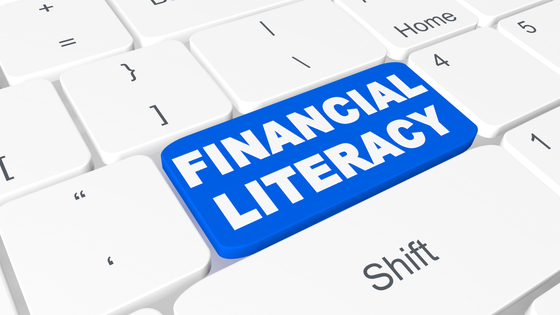Why is it important to be financially literate?
Why should an average person be financially literate? The reason is that we live in an era of consumption! One of the main criteria for judging the success of a person is to look at his bank balance.

Almost all walks of life are somehow connected with money. Not having money on hand, you can't build a house, raise a child, get education, go on vacation, or even put food on the table.
In general, the consensus is that higher the financial literacy of the population of a nation, the stronger and more stable its economy, higher the standard of living there. Countries with financially educated citizens are the most prosperous in the world. Is that a coincidence? Nothing of the sort!
When a person has money, he either spends it, paying VAT along the way, or invests, or deposits it in a bank account. In whatever scenario, the state gets more money in return and gets more prosperous.
In particular, it would be safe to conclude that a financially literate person is a wealthy person. He knows how to save and invest, and thus increases his wealth every year. He knows how to plan for future, and goes to sleep every day without being afraid of what tomorrow has in store for him. If he ever gets short of money, he quickly finds a way to earn more.
You cannot make any investment proposal attractive to those who do not know what investment is. In Russia, there was an attempt to launch investment programs, development plans, and pilot projects on financial literacy, but none of them acquired any concrete shape. Two crises erupted, in 2008 and 2014, and people had to learn how to handle their money, not in order to multiply it, but just keep their savings safe, and not lose them.
How does one become conscious of the need to be financially literate

- You never have enough money.
- You would like to earn more, but it doesn't work out - earnings are static or are decreasing. Salary is not being raised, bonuses are not given, and overtime is declined.
- Not able to save money, you are mostly living from paycheck to paycheck, sometimes even resorting to borrowing.
- You have to borrow to pay off the previous loan.
- You are afraid of investments, and even if you try to make money work, you lose more than you earn.
- You are afraid of the future, and not without reason: any financial upheaval, dismissal from work or illness can cause your world to collapse. Some try to mask their fear with the vacuous phrase "I live for today", probably with full justification, because there is not much left for tomorrow.
To become financially competent, you need not only be able to make money, but also be able to manage you have earned.
Why do people who win large sums in lotteries often spend them as if there is no tomorrow, and eventually are left with nothing? Those who do not know how to handle money may very likely lose their rational mind if they suddenly come into money. Instead of saving and finding ways to multiply the wealth, the financial idiots spend keep spending, losing touch with reality, becoming easy prey for scammers and those who like to have a good time at someone else's expense. Then one fine day, the winnings bottom out.
A financially literate person is likely not to buy lottery tickets. He generally does not spend money on dubious, adventurous schemes that promise quick get-rich rewards. His income grows more slowly, but it always grows, despite inflation and force majeure circumstances. He has savings that make it possible to be confident about the future and manage his life the way he wants.
He is independent, has several mutually independent sources of income, which allow him not to be stressed about one of them suddenly running dry. Such a person is not afraid of a stock market crash, losing of job or clients. When his passive income exceeds the monthly salary, he may have no need to work for anybody at all, and will have the option to do whatever he wants to, or devote himself to working on his own projects.
Lectera’s Online Courses by topic
Where do you acquire this competence?

There are no lessons for financial planning and investing either at school or at the university. This is not surprising, because economics is often taught by the same incompetent theoreticians who only repeat the outdated information written in textbooks. How many successful people teach finance at universities and colleges? The answer is obvious.
Most often, everyone who is interested has to look for information on his own and learn from their mistakes. Recently some short-term courses have become available that introduce you to the gamut of main financial instruments, help you analyze the trends, and begin to intelligently manage money and diversify income. Remember, you still need to be able to act on the information you receive in the course. Knowledge does not rearrange itself in your head, you will have to keep track of income and expenditure, perhaps open your first deposit or investment account. The trick lies in managing the money that you have, not just knowing how it's done.
What to do to have more money?

Diversified income is the situation when you receive income from several sources; for example, receive a salary and interest on a deposit. It is especially relevant for freelancers who live in a regime of perpetual instability and are handling several projects at the same time.
People who are employed have a lot to learn from the above category: When a freelancer's contract ends or his project shuts down, he may still continue to earn income from some other concurrent sources. If an employee is fired and he has no other sources of income, then the flow of money suddenly stops and the situation continues till he finds a new job. This may at times take months.
Define your short and long term goals. If you live from paycheck to paycheck, you won't be able to save up for a mortgage or a car. It will not be possible to find money for a medical emergency if there are no accumulated savings. Many people do not succeed in saving without a plan, on the other hand, if you have a clearly identified goal, it will be much easier to save towards it, and reach your objective in small steps.
Take a financial literacy course. During your studies in the course, you will understand how much money you really have, how are you spending it and how to increase your bank balance. Trying to copy other people's schemes of earnings will not work - everybody has a different set of conditions, different family and financial situation. The course helps you understand how to get out of the debt trap in the current situation, or how to never allow yourself to fall into one.
Share this with your friends via:
Latest News

In the UK, £23 million has been allocated for the expansion of the EdTech Testbed program — pilots of educational technologies in schools and colleges.

In the US, Tuskegee University announced the launch of Tuskegee University Global Campus (TUGC) — a new online platform for distance learning.

A significant stage in the development of the alternative education system has begun in West Northamptonshire in the UK: the County Council is actively calling on parents, guardians, and trustees to participate in shaping the future of this key area.

Outwoods Primary School in Atherstone, Warwickshire, having experienced deep sadness after the loss of their famous cat, Silla, has found solace in a new pet – a Maine Coon named Aloysius O’Hara.

In modern universities, artificial intelligence, and in particular ChatGPT, is rapidly transforming from a controversial tool into a full-fledged student assistant.












 Spring skills audit: what to remove, strengthen, and “sow” in learning
Spring skills audit: what to remove, strengthen, and “sow” in learning
 9 Career Mistakes Young Professionals Make
9 Career Mistakes Young Professionals Make
 £23 million allocated for the expansion of EdTech Testbed in the UK
£23 million allocated for the expansion of EdTech Testbed in the UK
 Test: How Psychologically Mature Are You? Check Your Inner Foundation.
Test: How Psychologically Mature Are You? Check Your Inner Foundation.
 Test. Check Your Social Media Dependency Level!
Test. Check Your Social Media Dependency Level!
 Test: What Business is Right For You?
Test: What Business is Right For You?
